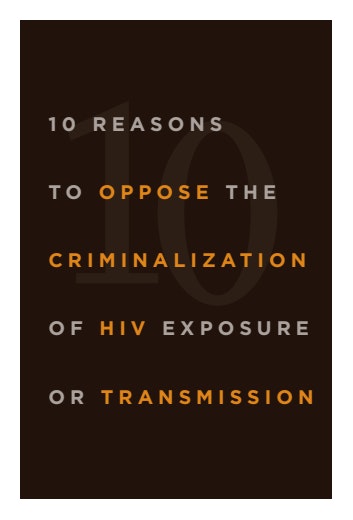Recent years have seen the creation—particularly in parts of Africa, Asia, and Latin America and the Caribbean—of HIV-specific laws that criminalize HIV transmission and exposure. At the same time, particularly in Europe and North America, existing criminal laws are increasingly being used to prosecute people for transmitting HIV or exposing others to HIV infection.
The push to apply criminal law to HIV exposure and transmission is often driven by the wish to respond to serious concerns about the ongoing rapid spread of HIV in many countries, coupled by what is perceived to be a failure of existing HIV prevention efforts. These concerns are legitimate. Recently, particularly in Africa, some groups have begun to advocate for criminalization in response to the serious phenomenon of women being infected with HIV through sexual violence or by partners who do not reveal their HIV diagnoses to them.
While these issues must be urgently addressed, a closer analysis of the complex issues raised by criminalization of HIV exposure or transmission reveals that criminalization is unlikely to prevent new infections or reduce women's vulnerability to HIV. In fact, it may harm women rather than assist them, and negatively impact both public health and human rights.
This document, co-produced by the Open Society Foundations, provides ten reasons why criminalizing HIV exposure or transmission is generally an unjust and ineffective public policy. It has been endorsed by leading human rights, AIDS, and women’s organizations and networks throughout the world. The document is part of a broader campaign on AIDS and human rights.
Please note: the Open Society Foundations will publish the name and location of all organizations that endorse the document, as well as a link to their websites. Email addresses and other information will not be published but may be used to contact organizations on behalf of the campaign. The Open Society Foundations will not use information for any other purposes, and will not share it with any other parties. For more information, please see the Open Society Foundations Privacy Policy.
Download
-
Ten Reasons to Oppose the Criminalization of HIV Exposure or Transmission (English) (200.79 Kb pdf file)
Download the booklet in English.
-
Dix raisons de s’opposer а la criminalisation de l’exposition au VIH ou de sa transmission (220.39 Kb pdf file)
Download the booklet in French.
-
Ten Reasons to Oppose the Criminalization of HIV Exposure or Transmission (Chinese) (388.14 Kb pdf file)
Download the booklet in Chinese.
-
10 Grunde, die gegen die Kriminalisierung von HIV-Exposition oder-Ubertragung sprechen (144.72 Kb pdf file)
Download the booklet in German.
-
10 razoes para se opor a criminalizacao da exposicao ou transmissao do HIV (122.07 Kb pdf file)
Download the booklet in Portuguese.
-
10 motivi per opporsi alla criminalizzazione della trasmissione o esposizione al virus dell’hiv (238.23 Kb pdf file)
Download the booklet in Italian.
-
10 razones para oponerse a la penalizacion de la exposicion al y la transmision del VIH (223.48 Kb pdf file)
Download the booklet in Spanish.
-
10 powodow dla ktorych nalezy przeciwstawic sie kryminalizacji transmisji i narazenia na HIV (320.47 Kb pdf file)
Download the booklet in Polish
-
Ten Reasons to Oppose the Criminalization of HIV Exposure or Transmission (Russian) (328.72 Kb pdf file)
Download the booklet in Russian.
